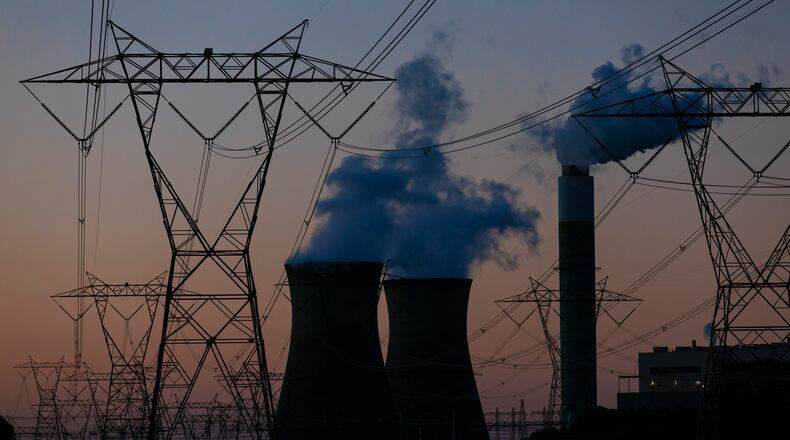Georgia Power customers’ monthly electricity bills already jumped once this year, but another, even larger rate hike is expected to kick in as soon as next month.
The new rate increase the company is asking for will be the subject of hearings this week at the Georgia Public Service Commission (PSC), which regulates the utility.
Environmental groups, consumer watchdogs and members of the public will have a chance to weigh in on the company’s request, but the five elected members of the PSC — all Republicans — will have the final say on how much customers’ bills go up.
Here’s how much they could rise — again — and why.
How much have rates jumped so far this year?
The average Georgia Power customer’s monthly bill went up by nearly $4 starting in January, after the PSC approved a $1.8 billion rate increase last December to pay for transmission upgrades and other costs the company said were needed to maintain reliability. The plan commissioners signed off on also calls for additional hikes of 4.5% to take effect in both 2024 and 2025.
That increase was part of the company’s regularly scheduled “rate case,” which it presents to the commission every three years.
What is this new increase for?
Georgia Power says this new increase request is to cover the outstanding cost of the coal, gas and nuclear fuel that it has used in power plants since 2021, plus its estimated fuel costs over the next two years.
The company typically brings these “fuel case” requests to the commission every two years.
How much are rates expected to climb?
The company’s initial request would have saddled ratepayers with a tab of between $2.1 billion and $2.6 billion in uncollected fuel costs, plus future expenses. If approved, that would have sent the average monthly bill skyrocketing by anywhere from $17 to $23.
But that request was made based on higher fuel cost projections. In recent months, fuel prices — for natural gas, in particular — have fallen sharply from heights seen during the COVID-19 pandemic and after Russia’s invasion of Ukraine.
Earlier this month, Georgia Power and PSC staff agreed to a framework that uses more recent fuel prices to estimate costs, and spreads the collection of the company’s outstanding fuel bill out over three years, instead of the usual two. Those moves reduced the company’s total fuel charge request by roughly $1.1 billion.
As a result, the company now projects customers will likely see an increase of around $15.90 on their monthly bills. Still, this fuel charge will have a much larger, immediate impact on bills than the rate increase that already kicked in this year.
Did the company agree to other changes?
The parties did agree to knock $7 million off the total sum Georgia Power is seeking to collect. But that will do little to dull the sticker shock for customers, who already face some of the highest electricity bills in the nation, according to federal data. Residential customers across the state — not just those served by Georgia Power — pay an average of $134.11 each month for electricity.
The agreement between Georgia Power and PSC staff also gives the company more latitude to adjust rates based on fluctuations in fuel markets. If approved by commissioners, the plan would allow Georgia Power to raise or lower its fuel charges by as much as 40% in between its normally scheduled “fuel cases.” The cap on fuel charge adjustments is currently 15%.
Georgia Power is also planning to increase the Income Qualified Senior Citizen Fuel Discount it offers from $6 to $8 per month, which customers 65 and older with a household income of $29,160 or less are eligible for.
Could the PSC order other changes?
Yes, but the plan the commission approves is expected to closely resemble the agreement reached between PSC staff and Georgia Power. Since Georgia Power is not allowed to earn profits on fuel expenses, utility regulators have typically allowed those costs to be passed on to customers with little adjustment.
What do other parties think about this?
Some interest groups that have intervened in the case argue that it’s unfair for the company’s customers to shoulder all of the burden of rising energy costs.
In pre-filed testimony, Jeremy Kalin — an attorney and consultant serving as an expert witness in the case on behalf of the Southern Alliance for Clean Energy and the Sierra Club — argued that the PSC can and should mitigate this “moral hazard” by requiring Georgia Power accept some share of fuel costs.
Other witnesses have taken issue with Georgia Power’s increasing reliance on natural gas as an energy source. The company’s long-range electricity generation plan approved by the PSC last year calls for the purchase of 2,000 more megawatts of natural gas capacity.
Brent Alderfer, a former Colorado Public Service Commissioner and current clean energy analyst, argued in filed testimony that natural gas prices are likely to remain volatile, and that by leaning harder on gas plants, Georgia Power risks inflicting more financial pain on customers.
“Without a plan to address heavy dependency on natural gas, fuel cost overruns will continue to burden customers and crowd out headroom for necessary improvements and investments by the utility going forward,” Alderfer wrote.
What’s Georgia Power’s response?
In their own pre-filed testimony, Georgia Power’s vice president and comptroller Sarah P. Adams and assistant comptroller Adam D. Houston acknowledged that fuel costs can fluctuate “rapidly and with great magnitude.”
But they said the company does factor in fuel cost impacts when making long-term decisions about how it sources electricity, and argued that this fuel case is not the appropriate time to review the company’s electricity generation mix.
When will the new rates kick in?
The PSC is expected to take a final vote on the fuel charges on May 16 and the new rates would kick in on June 1.
About the Author
Keep Reading
The Latest
Featured


